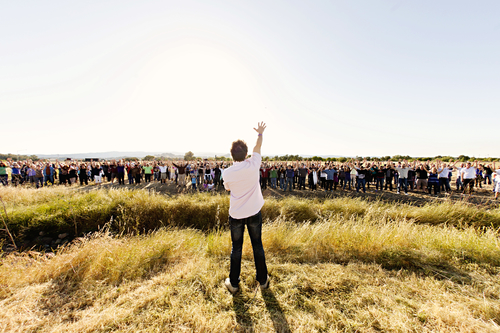Evil Lurking in the Heart of Man – Genesis 42:21 – December 15 2021
/0 Comments/in Enduring Words for Troubled Times/by David GuzikCutting Through the Controversy – Matthew 12:10-13 – December 14 2021
/0 Comments/in Enduring Words for Troubled Times/by David GuzikThe Help We Need – Hebrews 4:16 – December 13 2021
/0 Comments/in Enduring Words for Troubled Times/by David GuzikSchmerz, Macht, Verkündigung
/0 Comments/in Wöchentliche Andacht/by David GuzikVielen Dank dafür, dass Ihr Enduring Word zum Jahresende so großzügig unterstützt.
Benutze bitte diesen Link, um zu sprenden.
Philippus ging in die Stadt Samaria und erzählte den Bewohnern von Christus. Die Menge hörte ihm bereitwillig zu, und sie sahen auch die Wunder, die er tat. Viele böse Geister wurden ausgetrieben und fuhren mit lautem Geschrei aus. Außerdem wurden viele Menschen geheilt, die gelähmt oder verkrüppelt gewesen waren. Darüber herrschte große Freude in der Stadt. (Apostelgeschichte 8,5-8)
Philippus war in vielen Dingen wie Stephanus – er war einer der Männer, die auserwählt waren, den Gemeinden auf praktische Art und Weise zu dienen, als der Streit um die hellenistischen Witwen entbrannte (Apostelgeschichte 6,5). Er gehörte zu denen, die vor der Verfolgung fliehen mussten, und landete in Samaria.

Als er erst einmal in Samaria angekommen war, wusste Philippus, was er zu tun hatte: Er erzählte den Bewohnern von Christus. Nachdem viele der Juden das Evangelium erneut abgelehnt hatten, sehen wir, wie Gott das Angebot des Heils in Jesus, angefangen bei den Samaritern, auf andere Völker ausweitet.
Das war nun Samaria, die Assyrer etwa 750 Jahre zuvor dieses Gebiet im Norden Israels erobert und alle wohlhabenden und bürgerlichen Juden aus der Gegend verschleppt. Dann zogen die Assyrer aus der Ferne eine heidnische Bevölkerung heran. Diese Heiden heirateten in die untersten Schichten der verbliebenen Juden im Norden Israels ein, und aus diesen Menschen entstanden die Samariter.
Im Allgemeinen hassten die Juden jener Zeit die Samariter. Sie betrachteten sie als gefährliche Mischlinge, die der Anbetung des wahren Gottes einen großen Schaden zufügten. Zwischen einem Großteil der Juden und der Samariter herrschte seit langem ein tiefer Hass.
Die Erfahrung die Jesus mit der Samariterin am Brunnen machte (Johannes 4) und seine Geschichte über die Barmherzigkeit eines Samariters (Lukas 10,25-37) veranschaulichen die natürlichen Spannungen zwischen den Juden und Samaritern jener Zeit. Erinner Dich daran, dass Jakobus und Johannes (und auch die anderen Jünger) einst dachten, die Samariter seien nur dazu gut, im Gericht Gottes verbrannt zu werden (Lukas 9,51-56).
Doch Philippus erzählte ihnen von Christus. Weil Jesus in ihm gewirkt hatte, war in seinem Herzen und seinem Verstand kein Platz für diese Art von Vorurteilen. Er war verhielt sich gegenüber den Samaritern nicht rassistisch.
Philippus kam und verkündete das Evangelium, wobei Zeichen und Wunder als eindrucksvolle Bestätigung folgten. Philippus beeindruckte die Menschen, als die sie die Wunder sahen, die er tat. Als sie auf das Evangelium reagierten und zu Jesus fanden, herrschte große Freude in der Stadt.
Zweifellos bestand ein Grund für diese Frucht darin, dass Jesus während seines Dienstes in Samaria den Samen in den Boden gelegt hatte (Johannes 4,1-26). Jetzt brachte Philippus die Ernte ein.
Erinnere Dich an den Grund für den Aufenthalt von Philippus in Samaria – er war dort, weil die Christen in Jerusalem um Jesu willen verhaftet, verprügelt und sogar ermordet wurden. Er und andere flohen vor der Zerstörung und der Gefahr.
Die große Freude in der Stadt resultierte aus dem großen Kummer und dem Schmerz, den es in Jerusalem gab. Sie entsprang der Realität der geistlichen Macht (den Wundern, die er tat). Aber sie entwickelte sich am Stärktsen, als Philippus ihnen Christus verkündete.
Auch heute kann Gott den Schmerz seines Volkes, die Kraft des Geistes und die Momente nutzen, wenn wir anderen von Christus erzählen.
Remember the whole reason Philip was in Samaria – because Christians in Jerusalem were being arrested, beaten, and even murdered for the sake of Jesus. He and others fled the destruction and danger.
The great joy in that city came from great sorrow and pain in Jerusalem. It came from the reality of spiritual power (the miracles which he did). But it especially came as Philip preached Christ to them.
Even today, God can use pain of His people, the power of the Spirit, and the preaching of Christ.
Two Mighty Words
/0 Comments/in Weekly Devotional/by David GuzikYour year-end generosity to Enduring Word is appreciated. Click here to donate.
For it pleased the Father that in Him all the fullness should dwell. (Colossians 1:19)
We like the Christmas season, and we like to put our thoughts on the baby Jesus. So many aspects of the story appeal to us. We think of two relatively young people out among strangers and in great need. We think of the humble nature of their surroundings – no room in the inn – contrasted with the angelic glory of His birth announcement, even if it was heard only among a few shepherds. We think of the baby Jesus wrapped tight in fabric Mary probably brought with her all the way from Nazareth, knowing she would need it. We think of a little child on a starry night laid down to sleep in a feeding bin for animals.

All this is wonderful and true, yet it only scratches at the surface of the greatness of what God did on that night. The child sleeping in that manager was no mere man. God had humbled Himself to come not only in humanity, but in the full experience of humanity.
Theoretically, Jesus could have come to the earth as a 30-year-old man and began His public ministry immediately. After all, the first Adam came to the earth as an adult; perhaps the second Adam would also come that way. Yet it was good and right and important for the God to add humanity to His deity in a way that connected with the full experience of humanity, including the helplessness and dependence of a baby.
Yet make no mistake; Colossians 1:19 is just as true about the baby Jesus in the manger as it was true about the man Jesus on the cross: it pleased the Father that in Him all the fullness should dwell.
It is a broad statement – combining the two mighty words all and fullness. Put those two words together and you mean everything. There is nothing left out from the all and from the fullness, and these two words tell us that in Him – that is, in Jesus Christ – there is all of what makes God really God.
There was a definite idea behind the ancient Greek word Paul selected, the one we translate fullness. The ancient Greek word was pleroma, and it was a recognized technical term in the theological vocabulary of the ancient world, describing the total package of Divine powers and attributes. Paul took all that was implied in that one word and said, “All of this fullness – all of this stuff that makes God who He is – all of it dwells in Jesus.”
Notice that the fullness is in Jesus Christ. Not in a church; not in a priesthood; not in a building; not in a sacrament; not in the saints; not in a method or a program, but in Jesus Christ Himself. All who want more of God and all that He is can find it in Jesus Christ.
So long ago, all of that slept in a humble manger on that Bethlehem night.




